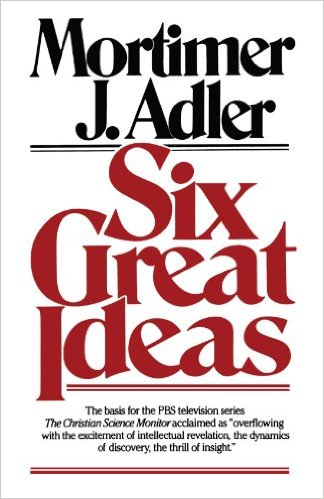|
Word Gems
exploring self-realization, sacred personhood, and full humanity
Dr. Mortimer J. Adler's
Six Great Ideas
|
The sovereignty of Justice among the second triad: only Justice is an unlimited good.
|
return to 'Six Great Ideas' main-page

|
Editor's note:
Excerpts from Six Great Ideas are offered below, indented format; plus, at times, my own commentary.
|
The Sovereignty of Justice...
As I observed a moment ago, all three of these values are real,
not apparent, goods—goods that human beings need for the
conduct of their lives in the pursuit of happiness. However, all
real goods are not of equal standing. Wealth and health, for
example, are inferior to wisdom and friendship. Some real
goods are truly good only when limited. Pleasure is a real good,
but we can want more pleasure than we need or more than is
good for us to seek or obtain. The same is true of wealth. These
are limited real goods. In contrast, knowledge is an unlimited
real good. We can never seek or obtain more than is good for
us.
Only justice is an unlimited good, as we shall presently see.
One can want too much liberty and too much equality—more
than it is good for us to have in relation to our fellowmen, and
more than we have any right to. Not so with justice. No society
can be too just; no individual can act more justly than is good
for him or for his fellowmen.
The failure to observe and understand the need for limita-
tions upon liberty and equality leads to serious errors about
them and to an irresolvable conflict between them.
On the one hand, there are the libertarians, who not only
place the highest value on liberty but also seek to maximize it
at the expense of equality. They not only want an unlimited
amount of freedom, but they are also willing to try to achieve it
even if achieving it results in an irremediable inequality of
conditions, under which some portion of a society, usually a
majority, suffer serious deprivations.
The only equality they are for is equality of opportunity,
because this encourages and facilitates freedom of enterprise
on the part of those who, favored by superior endowments or
attainments, can make the best use of their freedom of oppor-
tunity to beat their fellowmen in the race of life—the devil take
the hindmost! That a vast inequality of conditions will result
does not deter them, for in their view trying to achieve an
equality of conditions can only result in the loss of individual
liberty, which is for them the higher of the two values.
On the other hand, there are the egalitarians, who not only
regard an equality of conditions as the supreme value, but also
are set upon trying to achieve it even if that infringes in many
ways on individual liberty, and especially upon freedom of
enterprise, exercised with the help of equality of opportunity.
In their view equality of opportunity, if that alone exists and if
individual freedom in taking advantage of it is unrestrained,
will necessarily result in an inequality of conditions. This they
deplore. They seek to maximize an equality of conditions, even
if to do so requires many infringements upon individual lib-
erty, which is the lesser value in their view.
The conflict, not between liberty and equality, but between
extremist exponents of these values, cannot be resolved without
correcting the errors that lead to the extremisms respectively
espoused by the libertarian and by the egalitarian. These errors
can be corrected only by understanding that neither liberty nor
equality is the prime value, that neither is an unlimited good,
and that both can be maximized harmoniously only when the
maximization is regulated by justice.
Should an individual have unlimited freedom of action or
enterprise, or only as much liberty as he can use without injur-
ing others, without depriving them of freedom, and without
causing them to suffer the serious deprivations that are conse-
quences of an inequality of conditions? In short, should an
individual have more liberty than he can exercise justly?
Negative answers to these questions lead to the conclusion
that everyone should have only as much liberty as justice allows, and no more than that.
Should a society try to achieve an equality of conditions at-
tended by no inequalities in the degree to which individuals
enjoy that equality of conditions? Should it seek to maximize
such an equality of conditions, even if that results in serious
deprivations of individual freedom? Should it ignore the fact
that human beings are unequal as well as equal, in both their
endowments and attainments, and that they make unequal con-
tributions to the welfare of the community?
Negative answers to these questions lead to the conclusion
that a society should seek to achieve only as much of an equality
of conditions as justice requires, and no more than that. More
than that would be unjust, even as more freedom than justice
allows would be an unjust exercise of liberty that is license.
The reader will have noted that justice stands in a different
relation to liberty and to equality.
With respect to liberty, it imposes a limitation on the amount
of individual freedom that it allows, if the exercise of freedom
is to be just rather than unjust.
With respect to equality, it imposes a limitation on the kind
and degree of the equality, as well as the kind and degree of the
inequality, it requires, if a community is to deal justly with all
its members.
When justice thus regulates the pursuit of liberty and equal-
ity, both can be maximized harmoniously within the limits set.
The irresolvable conflict between the erroneous extremism of
the libertarian and the erroneous extremism of the egalitarian
vanishes. The sovereignty of justice has corrected the errors
and resolved the conflict.
|
